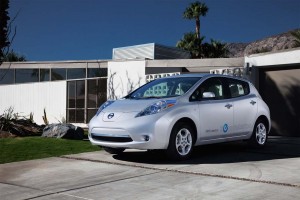Hoping to quell any concerns about the long-term reliability of its Leaf electric vehicle, Nissan will extend the warranty on the car to ensure customers that the Leaf’s batteries will be repaired or replace if they fall below a set level of performance.
The move will cover both new products and those Nissan has already sold since launching the battery-electric vehicle in late 2010. The extended warranty was triggered, in part, by concerns among a small group of owners in the Arizona desert who worried their batteries were losing capacity more quickly than anticipated.
“Our research has shown the cars are where we’d expect them to be,” Dave Reuter, chief U.S. spokesman for Nissan told TheDetroitBureau.com. A certain amount of battery loss, he stressed, “is normal over time…but we want those battery car advocates to have more confidence in their batteries.”
The new extended warranty is an industry first. Most manufacturers have told customers what sort of life they anticipate the batteries in their electric vehicles to deliver but, until now, no company has been willing to cover the anticipated decline by setting a specific marker as to what constitutes unreasonable battery capacity loss.
Nissan says the warranty will kick in if a vehicle’s lithium-ion battery pack loses more than 30% of its total capacity after five years or 60,000 miles. That could mean a full replacement or just the repair of one or more of the 48 battery modules that make up the Nissan Leaf’s lithium-ion pack.
Owners can readily tell if the pack is slipping below the 70% capacity mark by a steady decline in mileage – and the charge capacity indicator on the instrument panel will only reach eight of 12 bars or less.
(What’s included in a Nissan warranty?)
The long-term reliability of lithium technology has been an ongoing debate, though initial results suggest the first vehicles on the road are generally performing as well or better than expected. But a variety of factors can influence battery life, noted Reuter, including extended driving, the use of so-called quick chargers and high ambient temperatures, such as those often found in the Southwest.
Even so, Nissan’s ongoing research expects most Leafs operated in extreme situations like the Arizona desert to maintain at least 76% of their battery capacity – only a hair less than the 80% capacity originally forecast for the Leaf overall.
Concerns about battery capacity, especially in high-temperature situations has raised questions about Nissan’s decision to opt for an air-cooled battery pack rather than the more complicated, liquid-cooled system used in vehicles such as the Chevrolet Volt plug-in hybrid and the Toyota RAV4-EV.
But “there hasn’t been any discussion” of switching to the more complex and costly alternative for the Nissan Leaf or other battery models to come, insisted Reuter.
Nissan is betting big on its lithium-ion technology. It recently launched a new U.S. battery plant and pilot production of the Leaf at an assembly line in Smyrna, Tennessee has just gotten underway. Saleable vehicles will begin rolling off that line in January.
Demand for the Leaf fell off during the first three quarters of 2012 but have sharply rebounded in recent months.
To help boost sales even further, TheDetroitBureau.com previously reported that Nissan is expected to launch a stripped-down U.S. version of the Leaf next year, similar to a new base model it just launched in Japan.
(Learn more about Nissan extended warranty.)

